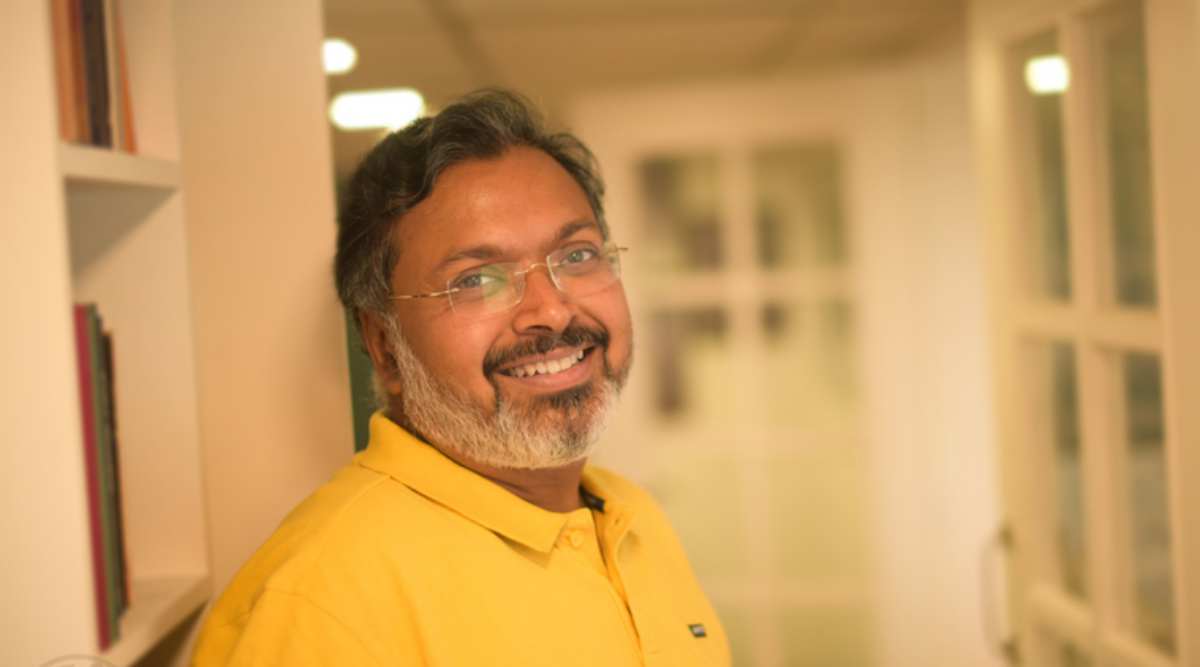No products in the cart.
Healing
Devdutt Pattanaik’s e-book explores Jewish, Christian and Islamic myths from a uniquely Indian prism – The Dispatch
-
The book “Eden: An Indian Exploration of Jewish, Christian and Islamic Lore” by Devdutt Pattanaik explores the vast world of Abrahamic myths from a uniquely Indian prism, through storytelling that is intimate but not irreverent.
-
The book introduces readers to the many captivating tales of angels, demons, prophets, patriarchs, judges and kings. It also retells stories from Mesopotamian, Egyptian and Zoroastrian mythologies that influenced Abrahamic monotheism over time.
-
Devdutt Pattanaik writes, illustrates and lectures on the relevance of mythology in modern times.
-
Read an excerpt from the book below.
Conflation
For an outsider, Judaism, Christianity and Islam seem like branches emerging from the same Abrahamic tree. However, for the insider, it is not so. Adjectives like ‘Abrahamic’ and ‘Judaeo-Christian’ became popular only in the latter half of the twentieth century and are accepted rather grudgingly, but not by all.
For centuries, Christians hated the Jewish people and saw them as Christ-killers. This gave rise to anti-Semitism, a systematic and structural hatred of the Jewish people across Europe. But in the 1940s, the Holocaust or the genocide of six million Jewish people in Christian Europe by the Nazis of Germany during the Second World War shocked the Western world. It forced them to confront their anti-Semitic ways and acknowledge the common root of Judaism and Christianity. Only then did the phrase ‘Judaeo-Christian’ come into being. Earlier, it was used for Jewish people who were recent converts to Christianity.
A thousand years ago, Christians fought the Crusades against Muslims for the control of Jerusalem. The conflict took a fresh form nearly a thousand years later, when, after the Second World War, colonial powers, all Christian, took control of the Middle East from the Ottoman Emperor, seen by Muslims as the Caliphate of the Islamic world. Israel was handed over to the Jewish people, upsetting the local Muslim population. Then, at the turn of the century, following the Gulf War and the 9/11 terrorist attack that brought down the World Trade Centre in New York, old wounds were reopened. America declared its War on Terror, which was seen as a veiled attack of the Christian nations against the Muslim world, under the garb of secularism and democracy. To heal these wounds, more and more writers started using the adjective ‘Abrahamic’ to refer to the common roots of Jewish, Christian and Islamic faiths.
Islamophobia, the structural and systemic hatred of Muslims, began with the Crusades, when Christians who saw sex as sin declared Muslims as heretics as they were comfortable with sensuality and even saw Allah’s heaven, i.e., Jannat, as a sensual place full of fountains, gardens and beautiful fairies. Islamophobia has re-emerged in Europe and America as Muslim migrants find their faith at odds with the liberal values of the modern world that is based on equality, secularism, regard for a country’s constitution over Sharia (Islamic law), and human rights for LGBTQ+ people.
Sources
The oldest versions of Abrahamic lore come from Jewish lore, which is over 4,000 years old. Orally transmitted for centuries, the twenty-four books of the Hebrew Bible, known as the Tanakh, were compiled roughly 2,500 years ago when the Second Jewish Temple was built with the support of Persians, after the First Temple had been destroyed by the Assyrians. However, what we have today are versions that were codified about 1,800 years ago, a few centuries after the Second Temple was destroyed by Romans. Later literature, also known as Rabbinic literature, contains many retellings. Orthodox Jewish culture, such as the Hasidic Jews, emerged only in the eighteenth century in Eastern Europe.
Christian lore is divided into the Old and New Testaments. The Old Testament is informed by the Hebrew Bible as well as other sources such as the Greek translation (Septuagint), the Syriac translation (Peshitta) and the Dead Sea Scrolls. The New Testament is based on the writings of the followers of Jesus: Matthew, Mark, Luke and John, written a century after the crucifixion of Jesus. It also includes the letters of St Paul.
Originally, the Bible was written in Hebrew and Aramaic, but by the fifth century it was rendered into Greek and Latin and finally into various European languages by the fifteenth century. It is now being translated into almost every language in the world, owing to the work of Christian missionaries. The most popular and highly influential English version, the King James Bible, is 400 years old.
Different Christian denominations value different retellings of the Old as well as the New Testament. For instance, as compared to the Eastern Orthodox Christians, and the Protestants, the Roman Catholics value different sources and different stories. The Eastern Orthodox Church, which follows the Julian Calendar, celebrates Christmas on 7 January, while the Catholic Church and Protestant denominations, which follow the Gregorian Calendar, celebrate Christmas on 25 December.
The Book of Mormon of the Church of the Latter-day Saints has a whole new mythology that was published 200 years ago. It is very popular in the United States and claims to be over 4,000 years old.
Islam is based on the Quran, which contains the message of God as revealed to the Prophet Muhammad. These were codified and standardized about two generations later by the Caliphs, who were the appointed leaders of the Islamic world. It is in old Arabic, and the orthodox resist its translation, insisting that the sound of the language helps in getting a deeper understanding of its contents, much more than its vocabulary and grammar—an approach to sacred scriptures also seen amongst many Vedic Brahmins of India. Value is also placed on the Hadith, which records the life of Prophet Muhammad and his many conversations and practices that continue to shape Muslim life.
Both the Islamic revelation and Islamic traditions contain references to several Jewish and Christian stories, which have since been compiled and retold in various languages such as Arabic (the 1,000-year-old history of prophets and kings, Tarikh al-Rusul wa al-Muluk, written by Tafsir al-Tabari; or the 700-year-old Al-Bidayah Wan-Nihayah, The Beginning and the End, written by Ibn Kathir; or the 700-year-old Qasas al-Anbiya, stories of prophets by al-Kisai); Persian (the 600-year-old Bereshit Nama and Musa Nama as well as the Ezra Nama by Shahin Shirazi); even Bengali (the 400-year-old Nabi-bansa, Lineage of Prophets, by Syed Sultan); and Tamil (the 300-year-old Sira-Puranam, chronicle of the Prophet’s life, by Umaru Pulavar). There are also, in India, many religious hagiographies of holy men, pirs, ghazis and sufis that are considered religious folklore locally but are not accepted by the wider orthodox Islamic establishment.
Narration
Presenting Jewish, Christian and Islamic lore in a single book is extremely challenging and not a very common practice in the Western world, which tends to focus on the differences.
Many present the tales as history, rather self-consciously, with excessive deference. Casual narrations, with embellishments, are seen as blasphemous, provoking outrage in some Abrahamic communities. Fear of retribution by God and God’s self-proclaimed representatives is always looming. Orthodox American Jews spell God as G-d as the Third Commandment states, ‘Thou shall not take God’s name in vain.’
Reverence and distance are deeply attached to Prophet Muhammad, whose name is often written in orthodox circles with the suffix PBUH (peace be upon him), quite unlike how Hindus would address Shiva, Shakti, Ram or Krishna, intimately, often as a friend or a relative, especially within devotional contexts. However, in recent times, new Hindu sects and cults are choosing formality as the preferred way for referring to Hindu deities, rejecting the playful informality of the past. So, at times in fear of rabid politicians, in the Hindi-speaking belt of North India, people expect you to say Ram-ji or Shri Ram, instead of just Ram—as Ram has been addressed for hundreds of years.
Then there is the pressure of political correctness, and cultural sensitivity: Does one use the familiar Old Testament names (Jesus, for example) or the less familiar Arabic names for the same character (Isa)? Since the stories are different in the two traditions, does one treat them as the same character? Should one write words such as god, and prophet, and pronouns for either, with capitalization, or without capitalization?
Which tale is original and which is a variant, which tale is a telling and which is a retelling? The Christian Bible is clear that the Hebrew Bible is the ‘Old’ Testament. But Islam does not see its stories as variants of the Hebrew Bible or its retellings. It considers all that is mentioned in the Quran, especially, to be facts, and so original tales, and all other renditions are considered as variants. Islam considers Adam to be the first prophet, an idea unknown in Jewish and Christian retellings.
In this book, I have chosen to narrate the stories the way Indian parents tell sacred stories to their children: unselfconsciously, respectfully, but casually, fully aware of my prejudices, and fully accepting that a prejudice-free story does not exist.
I have chosen to use the relatively more familiar Old Testament names— mostly, not always. Also, as names can be complicated and so distracting to unfamiliar ears, simplified spellings have been chosen, and often no name is used to focus more on the idea than the details.
Most importantly, I have included Indo-Christian and Indo-Islamic folklore to familiarize people with narratives that played a very important role in the spread of these religions in South Asia.

Excerpted with permission from Eden: An Indian Exploration of Jewish, Christian and Islamic Lore, Devdutt Pattanaik, Penguin India. Read more about the book here and buy it here.


